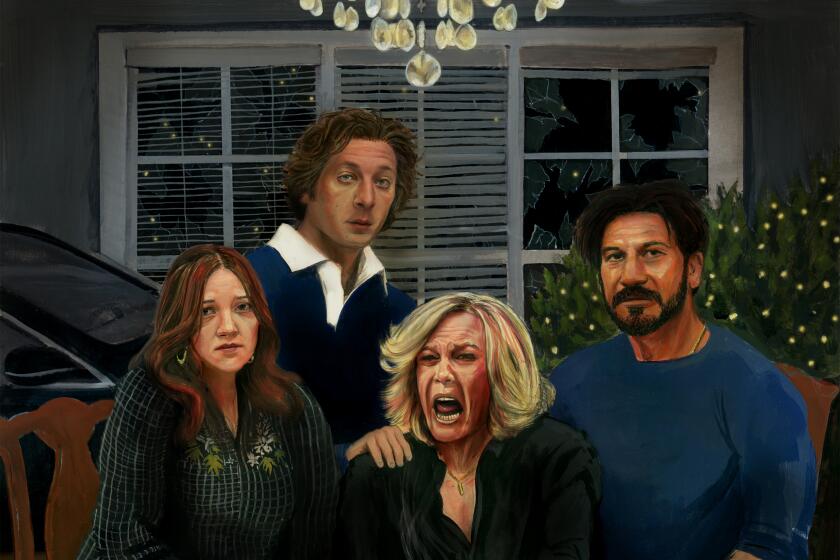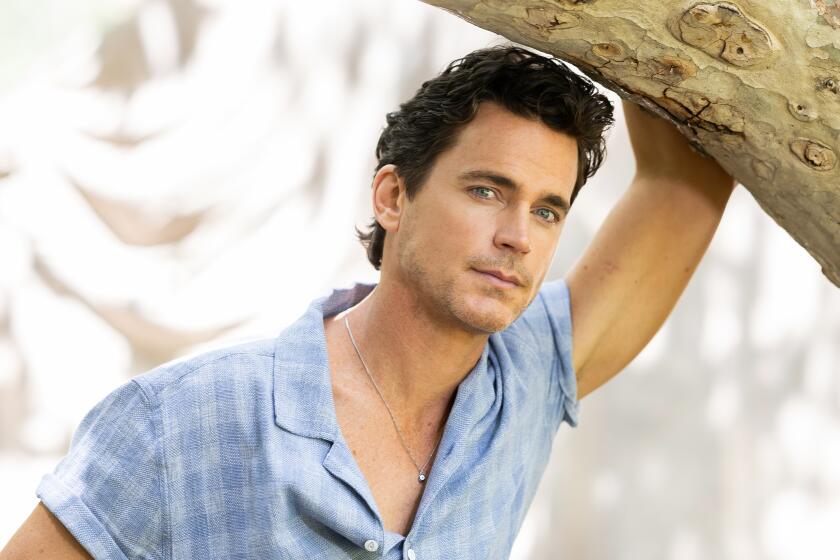Toronto Film Festival: Bill Murray keeps up the stripped-down cool
There’s a scene late in Bill Murray’s new dramatic comedy “St. Vincent” — so late, in fact, the credits are already rolling — that is seemingly innocuous, yet tells you a lot about Murray and this performance, and in fact Murray as a performer.
The film, about a gruffly comedic Vietnam vet and his unlikely friendship with a young boy, has ended, its drama complete. Nothing is left to be said or resolved, no more jokes left to make. Murray exits the back door of his character’s modest South Brooklyn home and attempts to water his lawn — really, a dirt patch with a few weeds in it. As Bob Dylan’s “Shelter From the Storm” plays both over the credits and in Murray’s ancient Walkman, Murray attempts to sing along. He is slightly behind the tempo, missing lyrics, going off-key. He’s also trying in vain to get the hose situated correctly, as it keeps falling over. Undaunted, he seeks new ways to position it. The names of the people who worked on the film continue rolling.
There is no big joke, and not really any new information. And yet there is something compelling about it. In part it’s that he just seems to be having fun, but it’s more than that, something ineffable, a subtle demonstration of talent, showing off his skills by not seeming to show off his skills.
As co-star Melissa McCarthy said, “I couldn’t believe that scene when I first saw it in the film. There’s just something about it. I could watch Bill do that for 17 hours.”
Film fans might not be blessed with that much Murray. But they may still get plenty in the months ahead. With his “St. Vincent” premiering at the Toronto International Film Festival over the weekend (it comes out in theaters Oct. 10), it will start a chain of Murray-ness that will make anyone who’s worn out a DVD of “Ghostbusters” or “Groundhog Day” very happy.
Following this film, in April, comes a movie from Barry Levinson called “Rock the Kasbah” in which Murray plays a washed-up music manager who, on a trip to Afghanistan, discovers a young local singing talent, then backs her efforts on a Kabul-set reality show. The following month brings a romantic comedy he shot with Cameron Crowe — Murray has a supporting role in the Hawaii-shot picture, which features Emma Stone and Bradley Cooper in the lead parts.
“It feels a little like when you’ve got an ace in the hole and no one knows it yet,” Murray said ruefully in an interview here.
Last Friday, the festival held Bill Murray Day. It’s starting to look a lot more like Bill Murray’s year.
--
“St. Vincent” could bring plenty of cachet all on its own.
Directed by the feature-film first-timer Theodore Melfi, “Vincent” stars Murray as Vincent, a brook-no-nonsense curmudgeon who has reduced his life to a simple but eclectic set of tasks — tooling around in a convertible, he hangs out with a brassy Russian stripper and part-time prostitute (Naomi Watts), makes frequent (and losing) bets at the track and visits an older woman in a nursing home in New Jersey. He eats sardines and has a surprising love for his cat. He seems unhappy, but may in fact be happy being this unhappy.
Into this sideways routine comes Oliver (pint-sized newcomer Jaeden Lieberher), who has moved in next door with his newly separated mom (Melissa McCarthy). Oliver is guileless and agreeable, and soon the two have formed an unlikely friendship. Oliver needs a father figure, such as Vincent is, and Vincent needs some youthful enthusiasm in his life, though he’d sooner have a hole in his head. The relationship develops in ways you’ve seen in intergenerational dramedies before, but somehow it maintains its comedy, even as it goes to poignant and dramatic places.
“This movie starts out funny and it becomes something different. It’s an unusual structure that way,” Murray said. “It goes places and it can be rough. There are parts of the movie that just scrape you a little bit, even as there’s comedy.” (At a post-screening panel he would describe his goal for the film as “If we could avoid being schmaltzy. And we almost did.”)
Dressed in off-white buckskin shoes and red pants, Murray is eating lunch in a Toronto hotel. “You want any of this junk?” he offers, pointing to a dish of jelly beans and chocolates, as he eats his own complicated meal that involves at least several hard-boiled eggs in old-fashioned egg-holders. There is a game of Twister on the coffee table, which he says he loves to play, “but it’s more of a late-night game.”
Later that evening, at the afterparty for “St. Vincent,” he will indeed let loose, dancing with friends and cast, mouthing along the words to Prince and George Michael (but not Bob Dylan). It is an unusual way of dancing, lots of wrist and shoulders, and like Murray himself it manages to convey a kind of low-key drollery and I-don’t-give-a-fig abandon.
None of this, it should be noted, was as unusual as McCarthy’s first encounter with Murray. Nervous as she awaited him on set, she heard a knock at the door of her trailer and opened it to find Murray standing there. “He said, ‘You’re not the height that I expected.’ And then he kind of circled me, measuring me, and then he put his foot behind me like you do with a horse.” She added, “You get weird truths with Bill because he doesn’t push.”
By now the “St. Vincent” casting story has taken on its own legend. After Jack Nicholson decided not to do the movie, Melfi wanted to cast Murray. He pursued Murray for several months, and out of the blue the actor offered to meet Melfi for coffee the following day — but in New York. The director was in Los Angeles and said he couldn’t make it on such short notice. Murray said he could meet the following day — and by the way, did he mention it would be in Cannes? With family and work responsibilities, Melfi again regretfully declined, thinking he had lost him for good.
A few weeks later, Murray texted Melfi and said he was coming to Los Angeles, and could the filmmaker possibly meet him at United baggage claim (a spot that, it should be said, even by the low-standards of baggage-claim areas, is not one where a notable meeting is likely to take place).
Sure enough, Murray turned up, dressed casually, with golf clubs in hand. The two bought some grilled-cheese sandwiches at In-N-Out, and Murray had a driver take them out to Palm Springs, where they discussed the script the whole way. Murray’s main concern was that the story not have too much sentimentality — heart was OK, schmaltz was not. Melfi said he felt exactly the same way.
Then they reached a town near Palm Springs, and Murray said that this was his stop. He gave the driver a few hundred dollars and told him to take Melfi back to Los Angeles.
“I basically drove seven hours to end up right back where I started,” Melfi said. “But I was pretty sure I had him.”
--
Murray has always been about a kind of cool detachment. But that detachment seems to have increased lately, both in his roles and his life. He is as reluctant as ever to indulge in the Hollywood bustle, and with all his work in Wes Anderson films over the last 15 years, his eyebrow has sometimes arched ever-higher on screen.
“You try to make your life and your work so that they can just go one with another,” he said. “They’re here.” He makes a gesture that brings his two hands together. “You really want them to fit together.”
He continued, “There are people who are desperate or needy, and I feel some actors can be desperate or needy. They need to be loved, and their performance sort of shows that. It’s like, God, you’re already on a movie screen, relax. Somebody’s already watching you 8 feet high. You don’t have to be that pushy about it.”
(On a panel after the screening he took this idea and turned it into a conceptual joke. “I would just like to say something,” he told the audience of more than 1,000. Then he paused. “What would you like me to say?” He also said of the Bill Murray Day festivities generally — they included screenings of a number of his films, some of which he participated in — “If this is really my day, why do I have to do so much work?”)
Rumors that he lives off the grid save for a toll-free number whose voice mail is checked by either him or his lawyer may be slightly exaggerated — during the interview there is a smartphone on a side table, and it pings occasionally with news of a message, though one can’t rule out the possibility that it is pinging with an alert that there is a new message on the toll-free number’s voice mail.
Still, there’s a kind of hand-wave to most other accouterments. There are no handlers — no manager, no agent, not five publicists fawning over their client or calling journalists to ask about a story’s placement This is what reporting on entertainment must have been like in medieval times.
“You’re not really an island. Life is hard enough. Even if your goal is to be self-sufficient, you need all kinds of influences, including negative ones, to challenge what you believe in,” Murray said when asked about why he’s stripped it all down. “But in terms of this other stuff, that’s really learning, growing. I realized I didn’t need all that stuff. I didn’t need those particular trappings to do the work. I love doing the work. I really do. But all the trappings — the handlers, I don’t need that.... I don’t need it because I just know it gets in the way.”
Those lack of representatives, of course, can make things a little unsettling for those who want to work with him. Producers who’ve cast him have sometimes said they don’t know if he’ll show up. On the Crowe movie there were murmurings that he wouldn’t arrive when his shooting days began. He didn’t make a ton of contact with those working on the film but did let them know in his own Murray-ish way, reassuring Lieberher — his “Vincent” child costar who also worked on the Crowe film — not to worry and that he’d be there. “And then he just texted me one day and said, ‘Why don’t you tell everyone I’m going to be on my way,’” Lieberher recalled.
Murray’s mystique has grown despite — or because of — his intermittent communication and shoulder-shrugging stance in an age of, well, constant communication and celebrity positioning. It’s an anomaly he says he’s somewhat aware of but doesn’t seek to cultivate.
“People seem to like me on their own terms. There’s not a fanatic group of people out there. It’s not like a Bieber or Miley Cyrus thing. But people seem to just take it and relax and say ‘I enjoy this guy.’ I mean, that’s how I like to handle it too [with other entertainers]. It’s like, ‘This guy’s cool, he’s not shilling all the time.’ I pretty much go out only to sell my movies. It’s not like, ‘Oh God, I’m doing a movie.’ I don’t want to get down anyone’s throat. They don’t have to be on my website.”
“Kasbah” director Levinson said it’s that persona, as well as the roles he’s taken — which in the years since “Lost in Translation” have included a fair number of dramas, “Hyde Park on Hudson” and “Broken Flowers” and “Get Low” — that have maintained his luster all these decades since he arrived on the scene. “I think Bill has found a place where he can credibly slide from drama to comedy,” Levinson said. “He’s able to keep a freshness from literally one thing to another.”
He added that he doesn’t make too much of Murray’s halting correspondence before turning up on set. “That’s just Bill’s way of getting situated,” Levinson said.
Watts noted that she approached Murray with a certain amount of nervousness before she began shooting “St. Vincent.” “Bill doesn’t love everyone, I’ll say it,” she laughed. “And I heard about that and I was terrified to be with two of the comedic greats [Murray and McCarthy]. And I though this is really bad for me. I decided to stay in character with Bill because it would be too scary otherwise. And then I said, ‘Hey, it doesn’t matter if he doesn’t like me, do I like him.’” She laughed again. “And that seemed to work.”
Said Melfi, “Maybe earlier in this career some of what Bill does would be considered difficult. But it’s not difficult. It’s actually him being him and staying true to himself. If he’s grouchy, he’s grouchy. If he’s happy, he’s happy. He’ll always present as truthful and honest — with his friends, his family, filmmakers, random strangers. He’s like the character of Vincent. He’s disagreeable and lovable at the same time.”
Melfi described a moment he’d heard about when someone Murray knew casually stopped Murray on the street to tell him he liked Murray’s jacket. “Bill just took off it his back,” Melfi said, “and put it on this guy’s shoulders. Then he just turned around and walked away.”
More to Read
From the Oscars to the Emmys.
Get the Envelope newsletter for exclusive awards season coverage, behind-the-scenes stories from the Envelope podcast and columnist Glenn Whipp’s must-read analysis.
You may occasionally receive promotional content from the Los Angeles Times.









